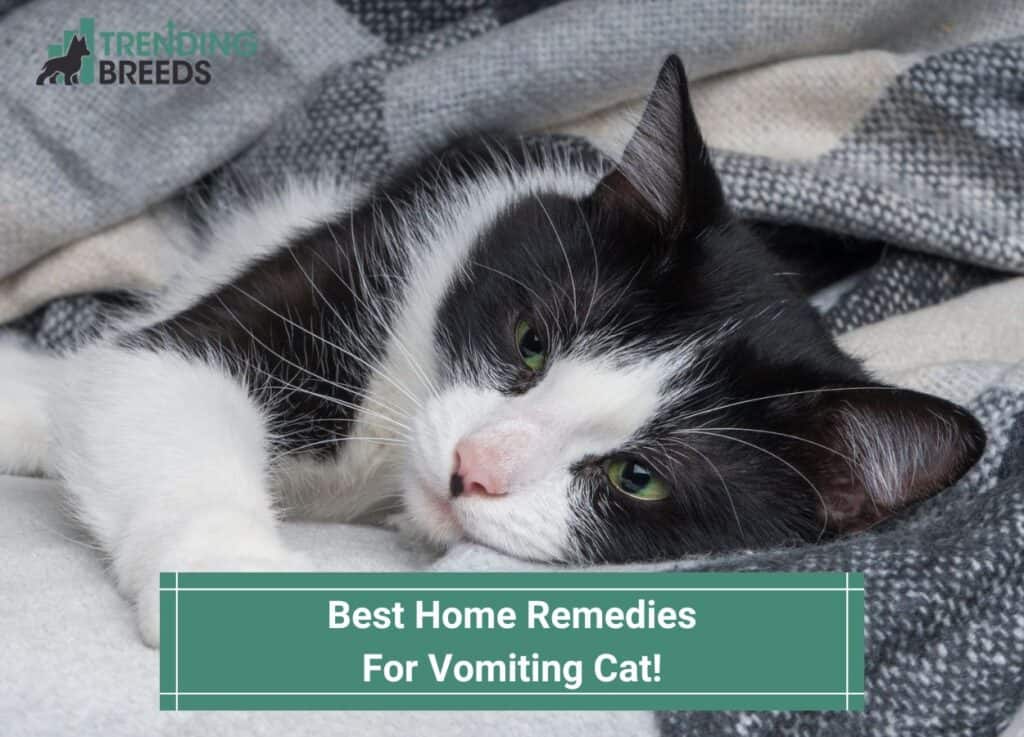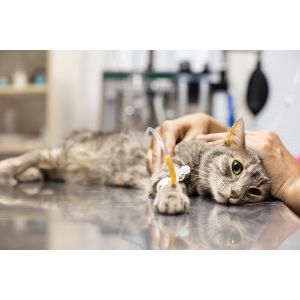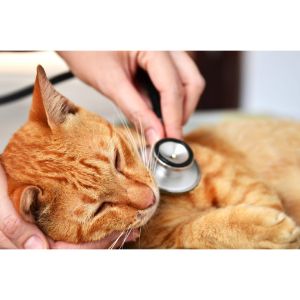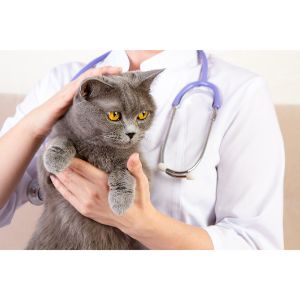
Is your cat throwing up? Several natural cures for cat vomiting are effective. You might need the best home remedies for vomiting cat to help ease your cat before you take it to the vet.
Stop reading right here and call your veterinarian if the vomiting is persistent or followed by other possibly dangerous signs, including stomach discomfort, the appearance of blood, excessive diarrhea, or lethargy.
Some common home remedies include reducing hairballs, keeping your cat on a short fast, giving them some mineral oil, giving them a bland diet, and last but not least, letting your cat have some ginger tea.
Keep reading below as we discuss these remedies in more detail.
Other articles you would like: Can Cats Eat Ants? and My Cat Is In Heat And Won’t Shut Up – What Should I Do?.
Table of Contents
Acute vs. Chronic Vomiting in Cats

Chronic vomiting refers to frequent vomiting that lasts for an extended length of time (at least monthly, although it might be daily). Typically, the cat only vomits once or twice every episode.
The acute kind occurs when a cat starts puking after never doing so before. You and your veterinarian should only be concerned when the cat vomits more than once.
The necessity of taking the cat to the vet and the diagnostic process and therapies for acute and persistent vomiting might vary.
A cat with acute vomiting typically needs emergency treatment. The only exception to this rule is a cat that is otherwise healthy and has only vomited one to three times.
Until you are certain that the cat ate anything toxic, the cat does not have to be sent to a veterinary facility if she still chooses to eat and, without vomiting, is behaving normally, and appears comfortable.
Your cat should be examined by a vet as quickly as possible if she throws up more than three times, has trouble swallowing food, and appears exhausted.
She could just be feeling sick, but if it’s something more significant, treatment must start immediately. Unless the cat is in excruciating pain or is immobile, she usually won’t need to see an emergency room.
However, an emergency consultation is advised if she worsens quickly over the night.
Waiting to seek treatment can be risky for cats constantly throwing up and having trouble keeping food down since they are susceptible to several secondary changes, most notably liver illness. If your cat is old, has a history of severe illness, or has been outside eating strange things, then vomiting may indicate something more serious.
However, if the cat is still eating and holding food down, is not exhibiting any lethargy, and appears at ease, it is not important to see a vet for a cat that frequently vomits.
In the past, it was usual for a cat to vomit a few times every month, but that notion is evolving. Cats do occasionally vomit hairballs. This habit is natural. But a hairball might get stuck or cause your cat to gag more than usual.
There is even speculation that a cat that often vomits hairballs may have a digestive disorder that prevents the hairballs from passing through the body normally.
A frequently vomiting cat might not even need medication, but an examination and workup should be performed to make sure the cat is healthy and therefore does not require any treatment at that point.
Causes of Vomiting in Cats

Certain exemptions exist, but acute and chronic vomiting usually have the same triggers. Chronic vomiting is not often brought on by toxins (unless the cat has ingested the same toxin over a long period).
Ingesting a foreign object (often a thread) is not usually a cause of persistent vomiting, but it can be if the foreign thing stays in the stomach.
Unfortunately, vomiting has many causes and is a highly ambiguous symptom. In addition, vomiting can be a symptom of practically any cat illness.
Toxins, medications, food (such as eating the wrong things), gastrointestinal (stomach), organ dysfunction, hormonal, neurological (usually brain-related), viral, and cancer are the broad categories into which vomiting causes can be divided.
There are hundreds of distinct illnesses and syndromes in each of these groups. Here are some of the most typical causes:
- Toxins: Lilies, antifreeze
- Drugs: antibiotics, anti-inflammatories, and chemotherapy
- Food: Consuming a dead animal, changing one’s diet abruptly, and dietary intolerances
- Gastrointestinal: unwanted objects, ulceration, stomach inflammation, constipation, cancer, acute inflammation, foreign objects in the digestive tract
- Organ dysfunction: pancreatitis, renal disease, and liver disease
- Endocrine: increased calcium levels, diabetic ketoacidosis, and hyperthyroidism (overactive thyroid gland)
- Neurologic conditions: encephalitis, an inflammation of the brain’s membrane, malignancies, and vestibular sickness, which may be related to inner ear conditions.
- Contagious diseases: heartworm and feline infectious.
- Cancer: Can be caused directly, as in the case of intestinal cancer, or indirectly, as in the case of skin mast cell tumors
Identifying Causes of Vomiting

It might be challenging to determine why a cat is vomiting. Most acute vomiting instances are temporary and improve with symptomatic treatment and time.
A basic physical examination is frequently advised to ensure a more significant issue is not present.
Obtaining a thorough history is the first step in determining the source of vomiting. Your veterinarian can ask the following:
- Did the cat come into contact with any poisons or plants?
- When did nausea begin?
- What does the cat typically eat?
- Does the cat venture outside? If so, does it go hunting?
- What is in the vomit?
- Does the cat take any medication?
- Does it also have diarrhea?
- Does the cat eat?
- What time of day—in relation to eating or other activities—does the vomiting happen?
- Is the cat shedding pounds?
- Does the cat urinate or drink a lot?
- Does the cat play with strings or yarn?
Your veterinarian can better understand which tests, if any, to utilize based on the responses to these questions.
Although the appearance of the cat’s vomit can not provide a clear explanation for why it is vomiting, it might help the veterinarian narrow down their search. The following vomit features, while not a perfect link, can provide some hints:
- Yellow vomit: Bile in the vomit indicates liver illness, yet it frequently happens when one is starving. The cat could have eaten something of this color, too.
- Clear vomit: This might come from an empty belly or reflux from the esophagus.
- White, foamy vomit: Once more, this is usually esophageal or empty stomach regurgitation.
- Vomiting blood: The blood would be from the stomach, esophagus, or mouth.
- Vomit that has a coffee-ground look: It is caused by stomach bleeding, which is most frequently associated with ulcers.
- Vomit that is brown and odorous: may result from an upper digestive tract hemorrhage or from eating anything odorous and brown.
Vomiting up undigested food indicates that the meal was never actually digested. It can occur due to food allergies or intolerances, blockages, or anything else that irritates the upper gastrointestinal system.
Knowing when the cat previously ate is crucial. For example, it might indicate an obstruction or a motility condition if the cat hasn’t eaten in a day and is vomiting undigested food.
Home Remedies for Vomiting Cat

Following are some common home remedies for a vomiting cat:
1. A Very Short Fast
Vomiting is frequently treated at home with the advice to stop feeding for a while, but cats are an exception to this (and numerous other things!).
Cats that do not consume enough food, even briefly, are more likely to develop hepatic lipidosis.
You can put your cat on a fast for 8 to 12 hours. Missing one meal won’t hurt your cat and can give her upset stomach a chance to settle. But don’t forget clean, fresh water to avoid being dehydrated.
Cats are less likely than dogs to drink too much water. Call your veterinarian if your cat’s vomiting persists or if it won’t eat after around 24 hours.
2. Bland Food

Another strategy to calm your cat’s digestive system is to feed them bland, easily digestible food but delay feeding them for at least 3 to 4 hours after their most recent vomiting incident.
Start by presenting a few pieces of cooked chicken with white meat (no skin or bones). If the cat manages to eat this, you may provide tiny amounts every few hours or add some white rice.
You may also get bland cat food that is simple to digest via your vet.
When your cat appears to be returning to normal, gradually transition her to her normal food or food for sensitive stomachs. Don’t feed just chicken and rice for over a few days because it is not a healthy or full diet.
Once your cat has been eating cat food for around 3 to 5 days, slowly combine decreasing amounts of chicken and rice with increasing amounts of cat food.
3. Feeding Your Cat Special Food for Sensitive Stomachs
You might want to modify your cat’s diet once they can resume eating routinely.
Your cat’s discomfort may be reduced by switching to food specially designed to be gentle on the stomach, such as premium sensitive stomach cat food.
Switching your cat to an all-wet food diet may be worthwhile if they currently only consume dry food.
If switching to sensitive stomach cat food solves the problem, it may be a sign that your cat’s vomiting was caused by their diet. For instance, they can be allergic to one or more substances or have a food intolerance.
4. Hairball Treatment

In cats, long-lasting, intermittent vomiting is frequently caused by hairballs. A hairball cure will help if your cat is throwing up due to hairballs.
But if your cat passes hairballs more frequently than once every two weeks or so, you must talk to your vet. Health issues affecting the gastrointestinal system, fur, and skin are frequently linked to recurrent hairballs.
There are several treatments for hairballs that you may try. A lubricant-based hairball control cream is one of the most popular forms. The taste of hairball control gels encourages cats to quickly lap them up (usually).
Never give your cat butter, lard, grease, or vegetable oils as a DIY hairball remedy. They will, at best, be ineffective. They may, at the very worst, seriously harm your cat.
Hairballs can be prevented by giving your cat more regular brushes and a diet designed to avoid them.
5. Use Ginger Tea
Ginger tea is one of the greatest all-natural remedies for a cat’s nausea and vomiting problems. Why so?
Well, ginger tea has antioxidants and, more significantly, ingredients that are good for cats.
The tea does a fantastic job of enhancing your cat’s ability to digest food, enabling straightforward passage. Cats may get a smoother stomach lining, and the vomiting problems will eventually go away.
Although ginger tea is available in packs, using the root is preferable.
- Peeling and cleaning the ginger root are good places to start. By doing this, your cat will only consume the root’s essential nutrients while avoiding skin or other debris.
- The root should next be chopped into pieces no larger than a third of a teaspoon. It works well with a 1/4 teaspoon.
- Thereafter, boil the roots in water for 15 to 20 minutes before letting them settle. This enables the taste to envelop the water and infuse it uniformly.
Give them the tea in little doses once it has cooled to a temperature where cats can safely drink it. Every couple of hours, giving them a spoonful or two to drink is normally advised.
To avoid giving larger cats (those weighing above 9 pounds) too much, splitting their body weight into fifths is advisable.
Even though it can be tempting to give your cat ginger tea immediately after they throw up, it’s preferable to wait a little while.
6. Use Mineral Oil

Utilizing mineral oil is yet another all-natural remedy you may try to aid your cat with vomiting.
Mineral oil is an excellent option since most vomiting is caused by hairballs rather than the food itself. It can help cats get rid of hairballs. This may be seen as more of a preventative step than a response.
Add a tiny bit (about a teaspoon) to your cat’s food, and let it take care of the rest. It has been demonstrated to be an effective at-home treatment. This can also help you avoid spending too much on meals designed to prevent hairballs.
Consult a vet before you give your cat mineral oil. Some cats do not react well to this home remedy.
Frequently Asked Questions
Does catnip settle a cat’s stomach?
Catnip can help cats in small doses, especially if they are vomiting or having diarrhea. However, too much catnip will make their tummies even more upset.
What do vets give cats for upset stomach?
Veterinarians generally rely on anti-nausea medication in oral form or as an injection. Your vet may also suggest bland food or fasting until the cat stops exhibiting symptoms.
Can I give my cat baking soda for upset stomach?
Baking soda is a harmful substance for cats and dogs. Do not rely on this to resolve your cat’s vomiting.
What Are Some Best Home Remedies for Vomiting Cats?

Cats frequently vomit without any major issues. However, keep in mind that while vomiting is a reasonably normal issue for cats, it shouldn’t happen frequently.
Therefore, even if your cat’s vomiting isn’t extreme, take them to the clinic if you find them doing so frequently.
You will also like:
- How To Get A Cat Out Of Heat With A Q Tip?
- Black Smoke Cat Guide – What You Need To Know
- Can Dogs Get Kennel Cough From Cats?
You can learn more about cats’ health by watching “If Your Cat Does This, IMMEDIATELY Call The Vet (16 Signs Your Cat Needs Urgent Help)” down below:




